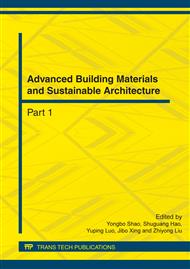p.3157
p.3161
p.3166
p.3171
p.3176
p.3181
p.3186
p.3190
p.3196
Practical Studies of Ecological School Design on China’s Loess Plateau
Abstract:
In terms of the poor conditions of China’s Loess Plateau region, the feasibility limited by budget and conventional resources for construction is the main challenge faced by ecologically design for local buildings. Aiming to explore a way towards an ecological architecture suited for this region, a primary school project is studied as a prototype. The methodology combining condition analyses, computer simulation experiments with TAS and field construction is involved with thermal design as the focus. Based on locally available materials and vernacular technology, a series of alternative techniques and feasible thermal design strategies for this region are carried out and further alternatively validated in construction, aiming to reach the most effectively ecological approach. By comparing with local conventional buildings, it is found that with similar construction cost the classrooms can contribute a far better ecological performance in indoor thermal comfort, energy consumption and environmental impact. It illustrates to the locals a feasible way for current local conditions, in which by selectively employing their familiar techniques and materials they can easily build themselves their most affordable and most effective ecological approaches.
Info:
Periodical:
Pages:
3176-3180
Citation:
Online since:
May 2012
Price:
Сopyright:
© 2012 Trans Tech Publications Ltd. All Rights Reserved
Share:
Citation:


